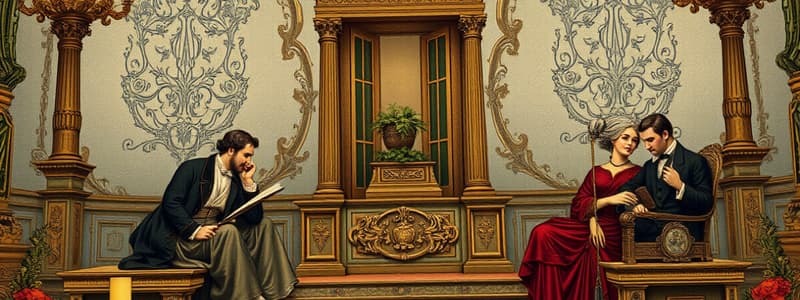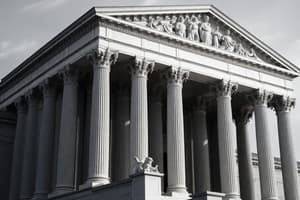Podcast
Questions and Answers
What was the Midnight Judges Act?
What was the Midnight Judges Act?
It is a law that increases the number of judges in the Federal Judiciary.
What situation did Jefferson face when he took office and how did he respond?
What situation did Jefferson face when he took office and how did he respond?
Jefferson faced a stack of judicial commissions that needed to be delivered to new judges but did not want Federalists as judges, so he told Madison not to deliver the commissions.
What is a writ of mandamus?
What is a writ of mandamus?
It is an order by the court compelling someone to do something.
Who was William Marbury and what did he ask the Supreme Court for?
Who was William Marbury and what did he ask the Supreme Court for?
Signup and view all the answers
Who was John Marshall and what dilemma did he face in the case of Marbury v. Madison?
Who was John Marshall and what dilemma did he face in the case of Marbury v. Madison?
Signup and view all the answers
What legal reasoning did the Supreme Court rely upon in their ruling against Marbury?
What legal reasoning did the Supreme Court rely upon in their ruling against Marbury?
Signup and view all the answers
What is judicial review and why is Marbury v. Madison such an important case?
What is judicial review and why is Marbury v. Madison such an important case?
Signup and view all the answers
Study Notes
Midnight Judges Act
- Implemented to expand the Federal Judiciary by increasing the number of judges.
- This action was taken by the Federalists as they anticipated losing control, positioning themselves for minority status.
Jefferson's Challenge
- Upon taking office, Jefferson discovered unresolved judicial commissions for new judges.
- To avoid Federalist judges, he instructed Madison not to deliver these commissions.
Writ of Mandamus
- A legal order from a court that compels an individual or organization to perform a specific act.
- Often used to enforce the performance of a duty mandated by law.
William Marbury
- Appointed as a judge but did not receive his commission due to Jefferson's intervention.
- Sought the Supreme Court's intervention to compel Madison to deliver his commission.
John Marshall
- Served as Adam's Secretary of State and later became the Chief Justice of the Supreme Court.
- Faced a conflict in Marbury v. Madison, as enforcing the commission could be ignored by the Jefferson administration.
Supreme Court's Ruling
- The court ruled against Marbury based on the Judiciary Act of 1789.
- Determined that while Jefferson and Madison were wrong in their actions, the specific writ of mandamus was unconstitutional.
Judicial Review
- Defined as the power of the judiciary to review and nullify laws that violate the Constitution.
- Marbury v. Madison established the principle of judicial review, marking a crucial moment in asserting judicial authority.
Studying That Suits You
Use AI to generate personalized quizzes and flashcards to suit your learning preferences.
Description
Explore the key events surrounding the Midnight Judges Act and the Marbury v. Madison case. This quiz covers the expansion of the Federal Judiciary, Jefferson's challenges, and the role of John Marshall. Test your understanding of these pivotal moments in American legal history.



